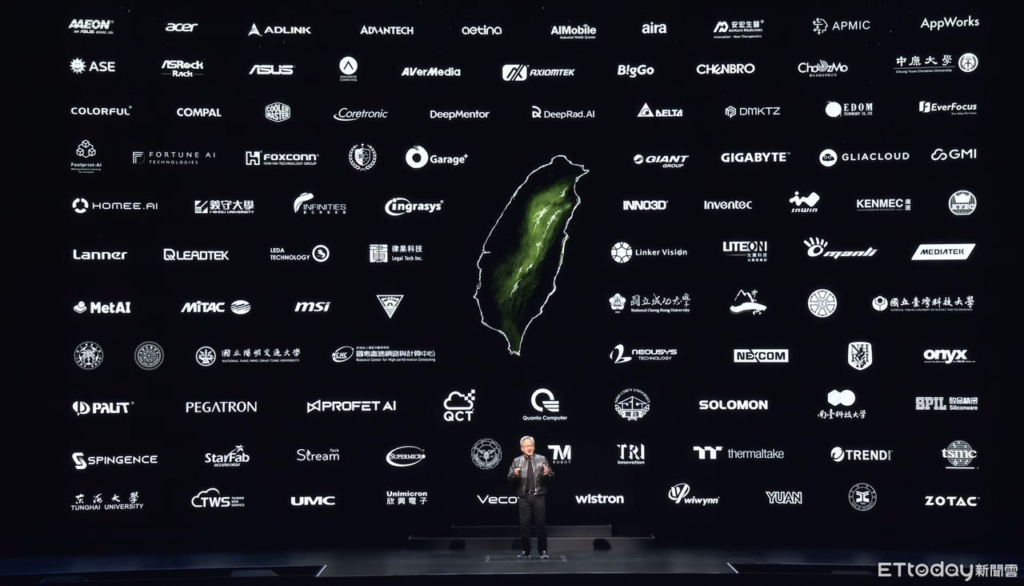2024年6月2日,全台最受矚目的男人黃仁勳,a.k.a「AI教父」在台大演講,場面之盛大如同參加大明星所舉辦的演唱會,難以想像這竟是一場科技公司的主題演講。
在這兩小時的演講中充滿了令人耳目一新的環節,一再讓人感到「白洞、白色的明天在等著我們」,這樣的興奮感讓人彷彿回到當年喬布斯所主持的蘋果發佈會。
然而,會議中許多投資人最關心的是他背後的輝達供應鏈,即「黃仁勳看板股」,其中43檔的台灣上市櫃公司成為大眾焦點。

輝達黃仁勳成為股市救世主?
一時之間,一個神秘的順口溜悄然開始流傳:
「輝達發大財,黃爸報明牌,亮燈亮整排,明天吃牛排!」
果然,隔天星期一,台股竟然在三大法人合計買超48億的情況下,強勢大漲400多點,看板股表現更是非常亮眼,出現14股票漲停,市場情緒更是高昂到不行。然而,到了禮拜二風雲變色,昨日漲停的股票有些直接跌停,即便盤中傳出computex電腦展開幕,老黃積極與相關供應鏈廠商互動的新聞卻也未能挽救頹勢。
「接下來怎麼辦呢?」
如果是在這兩天才買進的投資人,現在無疑是一個很痛苦的處境,該立馬停損還是至少凹到回本?
這樣尷尬的處境,我想是大多數股票投資人都曾體驗過的人生經驗。
對此我想了幾個辦法,來避免自己面臨如此之囧境的發生:
- 檢查賴群是否有完全不相干的群組也會「甲好鬥修報」,比方說球友群、家長群、遊戲群等,平常不聊股票的群組,竟然忽然分享一些很誘人充滿利多機會的標的,我將其視為一個嚴重過熱的訊號,絕對不應該跟著買!
- 如果這是有時間性的利多消息,那就在發生前幾天就先走,以這次而言就是台北電腦展開幕前就先賣。因為常常可以觀察到股價短期「利多出盡」的現象,當大家認同的利多到來後,股票卻並沒有隨之大漲,僅在平盤小跌間跳動,這很可能是在先前就反映完了,因此接下來很可能會有一陣回檔的期間。
有一個核心的心法可以作為總結,「股票投資上千萬不要一窩蜂湊熱鬧」,就如同以前文章提到的,無論這個理由多麽合情合理,都不要因而買單。尤其當平時不聊股票的群組突然開始分享股票資訊時,這很可能代表市場反應過度,風暴即將來臨。另外,面對有時效性的利好消息,提早賣出可以避免「利多出盡」後的風險。
最後,回應標題這些看板股究竟是名牌還是冥牌?
答案是我不知道,預測未來是神在做的事,人很難準確預測股票走勢。或許以一週而言會跌,可是放長至一個月、一年甚至十年,誰又知道結果會如何呢?唯一能做的就是,保持理性,做好風險管理,不能僅憑一時的熱潮或名人效應做出決策,這樣才能更有信心抱住一檔你心目中的好股票!
Has Jensen Huang of NVIDIA become the savior of the stock market?
On June 2, 2024, the most anticipated man in Taiwan, Jensen Huang, a.k.a. the “Godfather of AI,” gave a speech at National Taiwan University. The event’s grandeur was akin to attending a concert by a superstar, making it hard to believe it was a keynote speech by a technology company.
During the two-hour presentation, there were numerous refreshing segments that repeatedly evoked the sentiment, “A white hole, a bright tomorrow awaits us.” This excitement was reminiscent of the Apple keynote events once hosted by Steve Jobs.
However, many investors were most concerned about the NVIDIA supply chain behind him, specifically the “Jensen Huang leading stocks.” Among these, 43 Taiwanese publicly listed companies became the focus of public attention.
A mysterious rhyme began to circulate for a while:
“NVIDIA gets rich, Dad Huang reveals the tips, lights are fully on, tomorrow we feast on steak!”
Sure enough, on the following Monday, the Taiwan stock market surged by over 400 points with a combined net buying of 4.8 billion TWD by the three major institutional investors. Leading stocks performed spectacularly, with 14 stocks hitting their upper limit. Market sentiment was extremely high. However, by Tuesday, the situation changed drastically. Some stocks that hit the upper limit the previous day plummeted to their lower limit. Even the news of Computex opening and Huang’s active engagement with related supply chain manufacturers couldn’t save the market from its downturn.
“So, what should we do next?”
For investors who bought in during these two days, it is undoubtedly a very painful situation now. Should they immediately cut their losses or hold on until they at least break even?
This awkward situation is an experience most stock investors have encountered at some point. To avoid finding myself in such an embarrassing predicament, I’ve thought of a few strategies:
Check for unrelated groups sharing stock tips: For instance, groups for sports friends, parent groups, or gaming groups, which usually don’t discuss stocks, suddenly sharing enticing investment opportunities. I see this as a serious overheat signal and would definitely avoid buying in!
Sell before timed positive news: If there’s a time-sensitive positive news, sell a few days before it happens. In this case, sell before the Taipei Computer Show opens. Often, we can observe the phenomenon of “all good news already priced in” where the stock price doesn’t soar with the news but instead fluctuates around the same level or drops slightly. This is likely because the stock price has already reflected the news beforehand, suggesting a potential period of pullback is coming.
A core principle that can be summarized is, “Never rush to join the hype in stock investing.” As mentioned in previous articles, no matter how reasonable the reason may sound, don’t buy in because of it. Especially when groups that usually don’t discuss stocks suddenly start sharing stock information, this often indicates an overreaction in the market and that a storm might be coming. Additionally, selling early in response to time-sensitive positive news can avoid the risks following the “all good news already priced in” scenario.
Finally, regarding the title, are these leading stocks truly top picks or just random tips?
The answer is I don’t know. Predicting the future is the work of gods; it’s difficult for humans to accurately predict stock trends. It might drop in a week, but who knows the outcome if we extend the timeline to a month, a year, or even ten years? The only thing we can do is remain rational, manage risks well, and not make decisions based solely on short-term trends or celebrity influence. This way, you can confidently hold onto a good stock in your mind!
